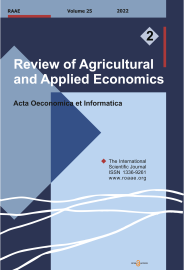KEYWORDS:
DEA, technical efficiency, determinants, milk
DOI NUMBER:
10.15414/raae.2013.16.01.02-11
ABSTRACT:
The objective of this study was to analyse the technical efficiency (TE) of the milk productionon totally 83 cattle herds (database of APRC Nitra) in the period 2006-2010 and to synthesise
impact of the main inputs (costs) on the TE value. A nonparametric approach Data
Envelopment Analysis with the input-oriented variable return to scale model was used to
evaluate the TE value. Average value of TE in the analysed period was 0.96, i.e. evaluated
herds reached 96% of technical efficiency in milk production on average. For these, reduction
of inputs by 4% is recommended to reach the efficiency at the given level of milk yield. Value
of individual inputs: total feed costs, material costs, labour costs, repair and service,
depreciation, other direct costs and overhead costs, should be reduced by 3.7, 10.0, 3.3, 15.8,
2.1, 2.9 and 8.5% respectively, while maintaining the same level of output. It is possible to
state that the analysed farms are inefficient in utilization of inputs for the given level of
output. The TE value was statistically significantly influenced by the feed costs only. The
negative influence of this factor indicates inefficient utilization of feeds (balance of feeding
ration, losses of storage, reciprocal substitution of feeds) or inefficient utilization of its
production potential in relation to the given output level.
Please Cite this Article as:
MICHALIČKOVÁ, Monika – KRUPOVÁ, Zuzana – KRUPA, Emil (2013) Technical Efficiency And Its Determinants In Dairy Cattle. Review of Agricultural and Applied Economics. XVI (Number 1, 2013): 2-11. doi: 10.15414/raae.2013.16.01.02-11
URL for sharing:
http://roaae.org/1336-9261/doi/abs/10.15414/raae.2013.16.01.02-11
FULL TEXT PDF:
▼ direct download link| view online in fullscreen ▲

